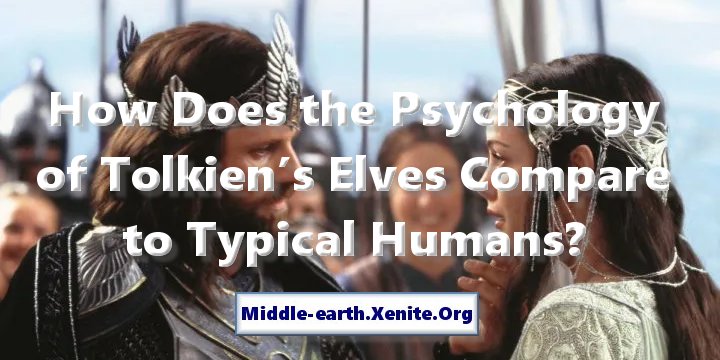
Q: How Does the Psychology of Tolkien’s Elves Compare to Typical Humans?
ANSWER: I once had a Quora account and answered many questions there. I closed my account in 2017 because I was tired of their constant changes to the user interface. I saved a few of my most popular answers for future republication here or elsewhere. And then I forgot about them.
You’ll see my original reply to this question below but I wanted to add some context. Many of us have owned pets. My wife and I have some dogs. One of those dogs so closely resembles another dog who died a few years ago she could be his great-granddaughter. She comes from the right area but she was a rescue and we know nothing about her ancestry. We affectionately say she is his grand-daughter.
The experience of sharing a home with a dog that so resembles in appearance and personality a previous companion is uncanny. There are days when we look at her and almost see him. I’ve thought about what I wrote on Quora years ago several times. When I wrote that answer I was thinking about characters like Elrond, who fostered many generations of Aragorn’s direct ancestors. Fingolfin and Fingon also lived beside several generations of Edainic leaders who served them faithfully.
We have a few texts that reveal J.R.R. Tolkien’s own insights into Elvish psychology. Two passages from The Lord of the Rings stand out for me. The first is Frodo’s encounter with Gildor Inglorion in the Shire. Gildor seems both interested and uninterested in Frodo’s adventure. He is restrained with the wisdom of long experience.
The second passage is Legolas’ explanation of how the Elves perceive time, when the Fellowship is traveling down the Anduin after leaving Lothlorien. There are a few other places in the book that provide insights into Elvish thinking, but not with so much exposition (in my opinion).
Beyond LoTR you can look at essays in books like Unfinished Tales of Numenor and Middle-earth, Morgoth’s Ring, and The Peoples of Middle-earth. Tolkien devoted a lot of thought to “how Elves think”. And, of course, he said the theme of The Lord of the Rings is “death and the search for deathlessness”. I don’t think people realize he was talking about the Elves’ search for deathlessness. They were trying to avoid fading by creating the Rings of Power. Other than the Nazgûl only 5 mortals had ever possessed a Ring of Power for any length of time: Isildur, Smeagol, Bilbo, Frodo, and Sam.
ORIGINAL REPLY
Imagine yourself befriending someone who only lives for 3 years. This person is about as intelligent and passionate as you are. You are able to travel with that person, have adventures with them, and do wonderful things.
And then they are gone.
Now imagine yourself befriending that person’s grandchild, enjoying this new person’s wit, wisdom, and wonder in the world. Imagine feeling deep love for this new person in terms of friendship, comaraderie, and brotherhood.
And after only two years that person dies in some horrible accident, or maybe in battle.
And you befriend that person’s child. And then you befriend the grandchild of your third friend.
After 30 years you have watched more than 10 generations of these people grow up, love life, and die. You were friends with many of them. You did great things with them. But they have begun to make songs about the mighty deeds of their ancestors and they look at you with awe, maybe some envy, and perhaps a little bit of fear because in a way that is completely contrary to the existence they have known you just keep on living.
To you it feels like maybe a third of your life has passed, but now someone with reliable knowledge says you will probably be around for another 80–90 years before you, too, are finally gone.
How many of these short-lived people will you be able to know deeply, grow fond of, and remember with joy as the years pass more slowly for you than for them?
See Also
Do Elves Dream of Eclectic Sleep?
Did the Elves Fear Death at All?
Who Were the Rings of Power Made for?
# # #
Have you read our other Tolkien and Middle-earth Questions and Answers articles?

It’s a topic that always interested me, elven mentality and so on, they also must have enormous mental capabilities, after all Elves have the memories of thousands of years of their life and all it entails, emotional baggage they need to carry, they are observing countless changes while they themselves change little or not at all, the world around them is in constant flux. Then the memory of knowledge and skill acquired during those years. As Tolkien hinted at, Elves seem to have some different mode of consciousness. There is a nice contrast in Treebeard’s words between Ents, Elves and Men:
“For Ents are more like Elves: less interested in themselves than Men are, and better at getting inside other things. And yet again Ents are more like Men, more changeable than Elves are, and quicker at taking the colour of the outside, you might say. Or better than both: for they are steadier and keep their minds on things longer. ”
It’s interesting how well Tolkien could make his races and peoples so distinct in terms of mentality.